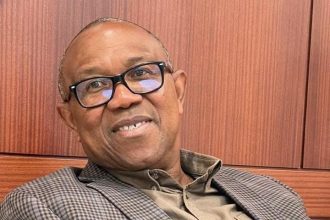The Securities and Exchange Commission has revealed that Nigerians have collectively lost about ₦316 billion to Ponzi schemes and illegal fund managers over the years, blaming greed and ignorance as major drivers of the persistent menace.
The Head of FinTech and Innovation Department at the Commission, AbdulRasheed Dan-Abu, disclosed this in Abuja during a journalists’ academy — a capacity-building session for finance reporters — while presenting a paper on combating investment fraud.
Dan-Abu described Ponzi schemes as fraudulent operations that pay old investors using money collected from new ones, without any legitimate business activity to sustain returns.
“These schemes are not really doing anything. They are just collecting people’s money and using it to pay the initial investors. At some point, when there are no new investors, the whole thing crashes and the operators disappear,” he said.
He noted that the craving for instant wealth has made many Nigerians easy targets for such fraudulent ventures.
“Everybody just wants to get rich today. That is actually what makes people fall into this trap,” he said. “Even the people who are greedy now are more educated than those who experienced Charles Ponzi’s first scheme. Education has not stopped greed.”
Dan-Abu recalled the notorious MMM Nigeria scheme, which promised 30 percent monthly returns and lured thousands of unsuspecting investors. “Even after MMM shut down, they came back and told people that if you pay a certain amount, you will get access to your lost money. People still paid. That shows you how greed blinds people,” he added.
He also cited the case of New Nation, Women in Oil, a fake empowerment programme that deceived 155,000 rural women by claiming government endorsement. “Many sold their houses and cars to invest because they believed it was real. It tells you how dangerous this thing is when people do not ask questions,” he said.
Data presented by the SEC showed staggering losses to different fraudulent schemes, including ₦100 million each in Cow Lane and Durrell Nigeria Ltd, ₦235 million in Now-Now Alert, ₦400 million in both G-Circle Investment and Box Value Trading, and ₦900 million in Yuan Dong. Dantata Success and Prof Coy accounted for between ₦1.2 billion and ₦2 billion, while Famzi Intbiz swallowed ₦2.5 billion and Bara Finance cost investors ₦3.5 billion, according to THEPUNCH.
Galaxy Construction and Transportation took over ₦7 billion, while MMM Nigeria wiped away ₦18 billion. Nospecto Oil and Gas and other so-called “wonder banks” accounted for ₦106.9 billion. The single largest case, still under investigation, involves more than ₦174 billion.
Altogether, the total losses were estimated between ₦315.24 billion and ₦316.04 billion, according to analysis of SEC data. However, The PUNCH observed that the list did not include Crypto Bridge Exchange (CBEX), a digital investment platform alleged to have defrauded Nigerians of over ₦1.3 trillion.
Dan-Abu warned that many of these operators rely on aggressive social media marketing, forming WhatsApp groups and using exaggerated promises to lure victims.
“They promise high returns with little or no risk. But there is no business in the world where you can make a lot of money in a short time without risk. It is not possible,” he said.
He urged potential investors to verify the registration status of any investment firm with the SEC before committing funds. “Anytime you see an investment that looks new, the first thing you should do is ask if it is registered with the SEC. It is your sweat, your hard-earned money. If it is not registered, it is already illegal,” he cautioned.
Dan-Abu appealed to journalists to support the Commission’s campaign against Ponzi schemes. “The press can really help us. If you write about this once a week, you could save thousands of people. Tomorrow, it might be your son, your cousin or your neighbour. It is not about foolishness; it depends on who the victim spoke to and what he believed,” he said.
He concluded by emphasizing that vigilance and collaboration remain crucial in eradicating the menace.
In his remarks, the Director-General of the SEC, Dr. Emomotimi Agama, said Nigeria must strengthen regulation of digital assets to safeguard investors and ensure financial system integrity.
Represented by the Commission’s Head of External Relations, Efe Ebelo, Agama described digital assets as “a structural pillar of modern finance” that requires the same level of oversight as traditional markets.
“Regulation is not about restriction; it is about building trust, ensuring that innovation serves progress and not predation,” he said.
Agama noted that Nigeria ranks among the world’s leading adopters of digital assets, with over a third of its population engaged in crypto-related activities. However, he warned that this rapid growth has also created opportunities for scams, phishing, and fake wallet applications.
He explained that the SEC’s 2022 rules on digital assets established a framework for virtual asset service providers, anchored on licensing, anti-money laundering compliance, and transaction transparency.
The Commission, he added, is collaborating with the Central Bank of Nigeria and the Economic and Financial Crimes Commission to freeze illicit wallets, recover stolen funds, and deploy blockchain analytics to trace suspicious transactions.
“Worldwide, regulators face the same paradox. Clamp down too hard and innovation migrates offshore; regulate too softly and systemic risks multiply. Our duty is to strike the right balance,” he said.
Agama stressed that while the future of finance is digital, it must remain ethical and transparent. “In this new frontier of finance, trust is the ultimate currency, and as regulators, our highest duty is to preserve it,” he added.











